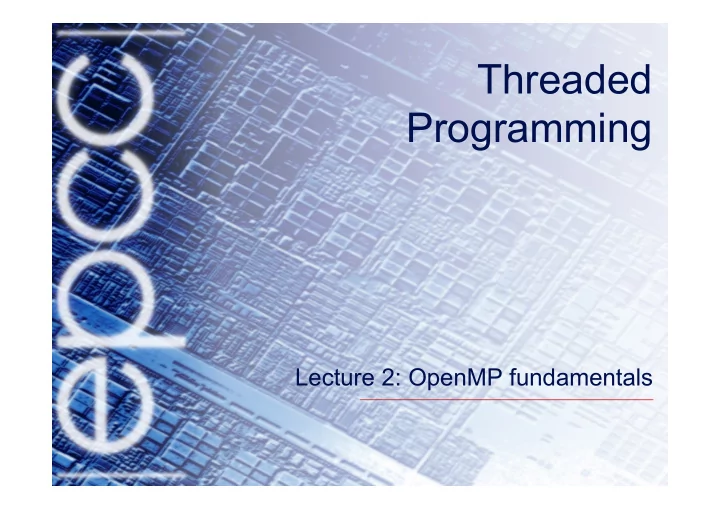

Threaded Programming Lecture 2: OpenMP fundamentals
Overview • Basic Concepts in OpenMP • History of OpenMP • Compiling and running OpenMP programs 2
What is OpenMP? • OpenMP is an API designed for programming shared memory parallel computers. • OpenMP uses the concepts of threads and tasks • OpenMP is a set of extensions to Fortran, C and C++ • The extensions consist of: – Compiler directives – Runtime library routines – Environment variables 3
Directives and sentinels • A directive is a special line of source code with meaning only to certain compilers. • A directive is distinguished by a sentinel at the start of the line. • OpenMP sentinels are: – Fortran: !$OMP – C/C++: #pragma omp • This means that OpenMP directives are ignored if the code is compiled as regular sequential Fortran/C/C++. 4
Parallel region • The parallel region is the basic parallel construct in OpenMP. • A parallel region defines a section of a program. • Program begins execution on a single thread (the master thread). • When the first parallel region is encountered, the master thread creates a team of threads (fork/join model). • Every thread executes the statements which are inside the parallel region • At the end of the parallel region, the master thread waits for the other threads to finish, and continues executing the next statements 5
Parallel region Sequential part Parallel region Sequential part Parallel region Sequential part 6
Shared and private data • Inside a parallel region, variables can either be shared or private. • All threads see the same copy of shared variables. • All threads can read or write shared variables. • Each thread has its own copy of private variables: these are invisible to other threads. • A private variable can only be read or written by its own thread. 7
Parallel loops • In a parallel region, all threads execute the same code • OpenMP also has directives which indicate that work should be divided up between threads, not replicated. – this is called worksharing • Since loops are the main source of parallelism in many applications, OpenMP has extensive support for parallelising loops. • The are a number of options to control which loop iterations are executed by which threads. • It is up to the programmer to ensure that the iterations of a parallel loop are independent . • Only loops where the iteration count can be computed before the execution of the loop begins can be parallelised in this way. 8
Synchronisation • The main synchronisation concepts used in OpenMP are: • Barrier – all threads must arrive at a barrier before any thread can proceed past it – e.g. delimiting phases of computation • Critical region – a section of code which only one thread at a time can enter – e.g. modification of shared variables • Atomic update – an update to a variable which can be performed only by one thread at a time – e.g. modification of shared variables (special case) 9
Brief history of OpenMP • Historical lack of standardisation in shared memory directives. – each hardware vendor provided a different API – mainly directive based – almost all for Fortran – hard to write portable code • OpenMP forum set up by Digital, IBM, Intel, KAI and SGI. Now includes most major vendors (and some academic organisations, including EPCC). • OpenMP Fortran standard released October 1997, minor revision (1.1) in November 1999. Major revision (2.0) in November 2000. • OpenMP C/C++ standard released October 1998. Major revision (2.0) in March 2002. 10
History (cont.) • Combined OpenMP Fortran/C/C++ standard (2.5) released in May 2005. – no new features, but extensive rewriting and clarification • Version 3.0 released in May 2008 – new features, including tasks, better support for loop parallelism and nested parallelism • Version 3.1 released in June 2011 – corrections and some minor new features – most current compilers support this • Version 4.0 released in July 2013 – accelerator offloading, thread affinity, more task support,... – now in most implementations • Version 4.5 released November 2015 – corrections and a few new features – no full implementations yet? 11
OpenMP resources • Web site: www.openmp.org – Official web site: language specifications, links to compilers and tools, mailing lists • Book: – “ Using OpenMP: Portable Shared Memory Parallel Programming ” Chapman, Jost and Van der Pas, MIT Press, ISBN: 0262533022 – however, does not contain OpenMP 3.0/3.1 features – second volume in production 12
Compiling and running OpenMP programs • OpenMP is built-in to most of the compilers you are likely to use. • To compile an OpenMP program you need to add a (compiler-specific) flag to your compile and link commands. – -fopenmp for gcc/gfortran – -openmp for Intel compilers – on by default in Cray compilers • The number of threads which will be used is determined at runtime by the OMP_NUM_THREADS environment variable – set this before you run the program – e.g. export OMP_NUM_THREADS=4 • Run in the same way you would a sequential program – type the name of the executable 13
Exercise Hello World • Aim: to compile and run a trivial program. • Vary the number of threads using the OMP_NUM_THREADS environment variable. • Run the code several times - is the output always the same? 14
Recommend
More recommend